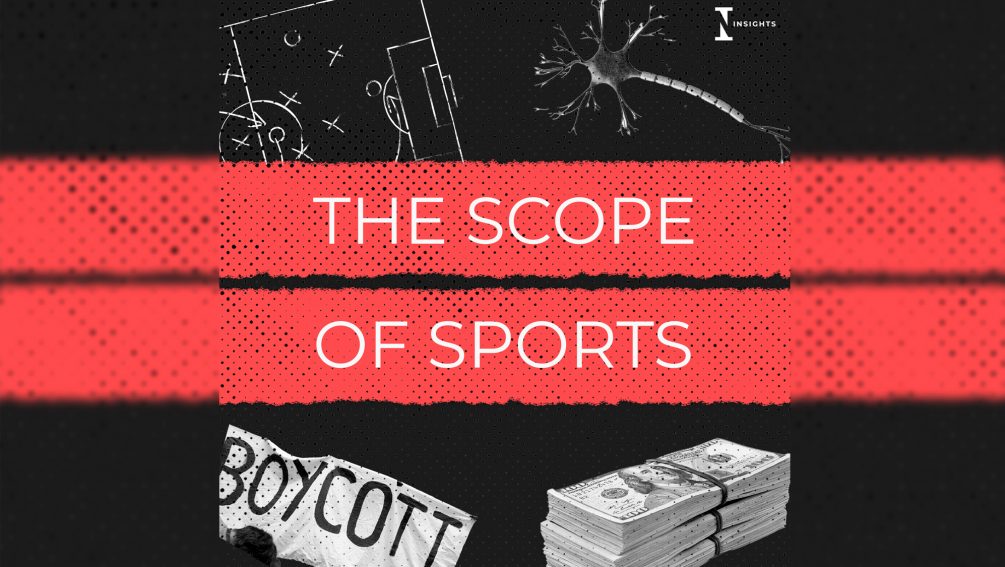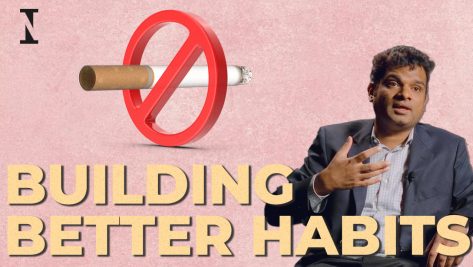Scope of Sports Ep 3: Sports and Leadership

Sports coaching requires a blend of technical knowledge, motivational techniques, and emotional intelligence, much like many leadership roles.
In this episode we speak to Albert Capellas, a professional football coach who has worked at some of the world’s biggest clubs – including FC Barcelona and Borussia Dortmund – to learn about his training style and find out how sports coaching techniques can be used in other fields.
© IE Insights.
Transcription
Alex Cope: For fans and spectators, professional sports provide an escape to a realm that feels far removed from our day to day lives. However, in reality, sports are full of normal people using normal tools to carry out their jobs. So what can we learn from the world of elite sports coaching? How far removed from the world of education is it and what techniques can we translate it into more regular working lives?
Today I’m speaking to Albert Capellas, a professional football coach who has worked in some of the world’s biggest clubs, including FC Barcelona in Spain and Borussia Dortmund in Germany. And we’re going to explore how coaching works in elite sports and some of the similarities and differences between this form of coaching and others, for example, in the workplace or in education.
Hi Albert and thanks for being with us today.
Albert Capellas: Hello, nice to speak to you again.
And you too. So you’ve worked with footballers of all ages and quality from children’s teams to household names in professional football. Is there something that links or connects the way you work with these different groups? A certain characteristic that you always try to use and is vital to your work?
Yes, I think there is a lot of links when you train footballers in different ages and also different quality. The first one, I think, is that you have to respect. It doesn’t matter if you are training kids or are training professionals, you have to try to respect the job, the preparation for what you are doing in the same level that all of them, they deserve to receive the best of you.
That is something that I try and it really works because when you are in front of players they really feel that you are taking care of them as good as possible. And that is why I like to train them with the same respect. Sometimes it looks like if only when you train with professionals, you prepare everything very accurate.
You take care of all the small details. I try to do the same with kids. And even if the level is not too high, for example, if I have to do a training camp, then maybe there are kids from different levels and they are not professionals and maybe they never will be professionals. I really like to give them a top experience in football because at the end the thing for them is very important for them.
That is one of the things that I think is very important. Then another thing that I really think about is how I can raise to the concentration. I think concentration is a key aspect in coaching, how you can keep the communication with your players to attract their attention. And again it’s about if you have prepared very well what you want to do, you get their concentration because concentration in training and in playing as well, it raises the quality of our lower level.
You know. A lot of players, they a lot of players, they have a good level. The problem is they cannot control their lower level. It is easy to do. Very easy. The simple things: don’t make mistakes in the simple things. There is a lot of good players that they do mistakes in simple things and it’s not that they are not capable to do it is because they are not concentrating.
And this a characteristic that happens with kids or one of our professional football players from Barcelona. That is one of the other keys that I say, okay, whatever I do, I have to try to keep their concentration, I think it’s very important.
And do you do that through you, through different stimulating exercises or through communication or a mixture?
Yes. But first, I would like to share with you. A lot of people try to raise the highest level of the player, the excellence of the player. And I’m a type of coach where what I am trying to do is to raise the lower level of the player, it’s much easier and you get much better results and you help them much more because they win efficiency, they win accuracy, it is much easier and you help them much more even with professional players.
And the way that I try to do it is first: very good preparation before you are in front of them, then if I have to prepare a drill before they go out, that everything for the setup is there, the balls are in the right place, the flat cones in the right place, the bibs, everything has to be very organized because when you change from drill to drill, it takes as little time as possible.
Because if you need to spend too much time from one drill to another drill, what happens is the concentration drops. And one of the things that I like to keep during the training is keep the tempo, the rhythm. If the session takes, for example, 1 hour 50 minutes, I like, okay, we start with warming up.
Everything has to be prepared: a minute warming up, now we go to boxes, that we spend 1.5 minutes from warming up to boxes. That means the water has to be in the right place. Everything has to work. We do 10 minutes boxes. Now, we all, for example, we do a control pass drill. We go from A to B, from B to C, also in the order that players they don’t take too much time.
If you take more than 2 minutes to change the drill to drill, they lose concentration and then it is much more difficult to start the next drill in a high level. That is why in training we have to talk less, coaches.
And be dynamic.
We have to talk much less that we do. We think that giving them a lot of information, we are helping them, and I disagree with that. We have to deliver very good information, but very accurate. That is why I always say: “Before you stop a drill, you have to think about the message you want to deliver to the players.” And don’t try to say five or six concepts.
Try to say one or two concepts and make it very clear and then start again the drill. That helps a lot to the players. If you don’t prepare before you start to talk which message you want to deliver, then what happens is that you start to talk without thinking, and then when you realize how much time you have been talking, then you say, “oh, I was talking 4 minutes, 5 minutes,” and that when you start again the drill, I promise you it will be much more difficult to train.
That is another thing that I like. Also I like that from one drill to another drill, there is connection. I mean, one activity, and then I change the drill and the activity is absolutely different. I like through the session, that everything that I am doing has a connection from simple to complex, but it has a connection.
For example, I do work a control pass, because it helps to control the ball, to pass the ball, the technique, the concentration, the body shape, the scan. And then I do, for example, a positioning game.
And it uses the drill from before. The movement is more complex. That is one more with open ends. And then I do a small-sided games for example in two touches. That is a connection between the first drill, the second drill and the third. And from simple to complex. Okay.
And I always like to finish the training sessions with football, with as close to football as possible. As close to a full game as possible.
Yes. Because it is the complex part. What I never do for example, in the main part, I do, for example, small-sided games, and then I finish the training with control pass. I never do that. I always do the simple things at the beginning.
And then build in complexity through the session.
And this the same for professionals and for kids. And also it depends on the level. And, and one thing that I learned is that there are not drills for professionals or for kids. The same drills can be done for professionals or for kids. For example, the positioning game 4v4 plus 3 ,in a space of 60 meters by 14 meters squared.
This drill is very difficult. Drill and the first team of Barcelona, they do this drill a lot of times, that is a very difficult drill to do. But you can do the same drill with kids of 12 years old that maybe they never will be professionals and maybe they don’t have high level. They just love football and they have normal qualities.
You can do this drill. What they find is in the space is more or less is the same. The difference is if you have less quality with the ball, when you move the ball, you also will have less quality. When you have to defend. That means the level of the drill decreases because of the level of the player. But the drill is the same.
The professionals will do the same drill faster. It will be much more accurate passes. But because in defense, they also are much better organized and they know much more when they have to jump, when they have to pressure, they are faster in movements, closing the passing lines, that also it will make it more difficult for the players outside.
That is also why you need better quality, better positioning. But they are practicing the same techniques as the children practicing. But they are practicing the same concepts. Only it’s the level of the drill.
Of course, there are drills that are buried, if you will, that you need a high level. But even these drills, you can do it with another type, both players. But you have accept that the quality, the technical quality and the quality of the positions that the players take, it will be worse.
And you mentioned earlier about being very precise with your communication during the drills and exercises when you’re in training, do you focus more on motivating the players or more of a side of being a teacher and showing them how to do something first?
We are very lucky because football is so motivating for iself. For me, what we have to do as a coach is please, don’t dismotivate them, you know, instead of motivate them. Be sure with the practice that you do into the field, don’t dismotivate them. And that is what I am worried about. But because when the players come to train and they go to play, they’re really are,
They really are motivated.
They should be motivated to play professional football.
And they are they love what they do. They are. But sometimes coaches, we can kill that motivation. Okay. That means for me it’s more the opposite. They have to be sure that they don’t stop their motivation. That is my main focus. Okay. That is why one of the secrets that I have that they don’t lose motivation is don’t talk too much.
If you talk too much, they drop, they drop, they drop and then they lose motivation. That is why I always say in my experience when you stop the drill. I always say, Albert think that you have a very hot cup of coffee on the table waiting for you. And when you stop talking, you have to be sure that you will drink that coffee still very hot. Okay.
It’s a good way to think about it.
It’s just a metaphor but it helps me. But please, this something that can happen a lot, especially when you train tactics, 11 against 11 tactical movements. In that moment you really can destroy the motivation of the players. That is why when I do tactical trainings, 11 against 11, it’s 10 minutes, 15 minutes and I only put three aims, to explain three aims.
I cannot do everything in one day. That is something that I really take care of, that it is and is difficult because you need a very good preparation. And sometimes, of course, I am a teacher, I am a teacher and I am also a football coach. Is difficult to divide when I am the teacher and a football coach because I think you can be a football coach being a teacher because, at the end you have people in front of you.
You are helping them to become better, to perform, to have fun, to enjoy the game, to develop their skills as individual players, but also as a team. That means no matter what you are always the teacher, for me it’s more which kind of teacher you are.
And what kind of teacher would you say you are?
Coaching is teaching, it’s guiding and teaching. It depends. Sometimes in professionals I spend time to convince them why which benefit you will get if you do what I am telling you. So as to try and let them find the answer?
It is not like this. I try to explain them. If you do this, you will get this benefit that makes sense for you if you do this, that the answer has to be “yes”. This not that I say you do this, just listen to me and you do this because I am the coach and you have to do what I have to do.
No, our message has to deliver information to the players that they can see, that they can find why, which benefits they will get if they do it individually and also with the team. That for me is very important. But a lot of times there is this kind of teaching that is about making questions all the time. They say, okay, what happens if we do this?
And what do you think if we do this? Analyze this situation and let me know what has happened and then another player can reply. And what do you think? What do you think? But if you use this method, it takes a lot of time. And what happened then? What happens is the concentration drops.
Yeah. And the motivation, like you said earlier.
Absolutely. Because you can do one time, two times, three times, but not every day, all the sessions all the time, of course sometimes I ask a player, what do you think about this? But there has to be a question that has to be answered in 5 seconds. And I cannot ask this two, six, seven players.
It’s a real focus on being dynamic.
This has to be dynamic. That means I try to use a kind of communication with the players that I try that no matter what, I will not lose the dynamic, no matter what, when we are on the field, the ball has to roll as many times as possible. Coaches we count, efficient time and total time.
For example, 60 minutes, total time possession. But then we count how much time we are doing the drills. So maybe, okay, 50 or 45 minutes of the 60 minutes, it has been efficient. That means the ball has been moving.
They’ve been practicing in what you’ve been telling me. That means 25% of the time I was talking, or I stopped And you have to be sure that this time is not more than 20%. Something like this.
So you keep quite a strict structure?
Yes. Because that helps me to be more accurate in my communication. It forces me to think before because I say, Albert you don’t have 4 minutes now. You only have one minute. And in this one minute you have to send some message. They take rest, they have to drink water, and they have to be prepared because in one minute I want to start again.
So you have to be very precise when you communicate.
Very, very, precise. Very, very, precise. You cannot give all the information in once.
And moving on, so you’ve worked in football clubs which are famous for having a very strong positive culture, especially in the youth teams like we mentioned. FC Barcelona comes to mind. It’s famous for having this culture throughout all levels of its football club. Where do you think that culture comes from and what does it look like in practice?
Do you feel the difference when there is a strong football culture at a football club compared to another?
Yes, absolutely. For me, the most important thing is the scouting. What it means, because now we are not talking about training.
That is when you are in a club and you want to develop players, for me, it’s very important that they know their football style. We are a team who like to play counter-attack, pressing high to make the re-pressure to try to get the ball back in the opposite half. Or we are a team that we like to sit back, that we wait, is not a problem if the opponent has the ball because then when they play the ball and I win it, I want to play a quick attack.
Or maybe I am a club, my football style. I want to have a lot of long ball possession, 60, 70, sometimes 80% ball possession, like Barcelona, that we don’t want to allow the opponent to have the ball and we want to dominate the game by having the ball. For example, we say if I have the ball, if we have the ball, the opponent cannot do anything, that means I have the control.
But for example with pressing, Klopp says now we play against the ball, okay, but the ball is the focus, but we play against the ball, we want to win the ball, we want to be aggressive. Then it’s a football style. Because if you have a very clear football style, it is much easier to select the right players for this type of football.
You select players for Atletico de Madrid, they are an absolutely different profile than for Barcelona. Or if you select players from Dortmund or you select players for FC Midtjylland or for Ajax. That is why is very important. And the clubs who have a very good identity developing players in their youth, they have a very clear way of playing and that helps them to have a very clear way of scouting players and that also helps a lot to define the way of training.
If you don’t have a very clear way of playing it’s impossible to have a very clear way of training. This triangle, it is very important that all three are connected. Sometimes I see clubs that they say “no we work very hard with our youth academy”.
Then “how do you play?” Oh we don’t care, 4-4-2, 4-2-3-1, 3-5-2. It doesn’t matter. Okay. And which kind of players you select. No, no. It doesn’t matter because we don’t know which kind of football we want to play with. That means then it’s much more difficult.
And I imagine it’s much more difficult for you as a coach. Even in training. It’s a lot easier if you have a culture that’s been there for a long time and is the long-term strategy to implement in training you know exactly what you need to do.
Yes, because also when you are developing players, if you know how the first team will play which football style you’re going to play, then you can work with the players for ten years, 12 years in that way. But if the first team every one year or every two years, every three years, they have different coaches with a different way of playing football, then it’s much more difficult to develop the players.
And that is what you feel with Ajax. They know how they want to, how they want to play. That is much easier when you are in the youth academy to work with the players because you, you know what they will get, what they will need, when they will arrive and be professionals in the first team.
With Atletico de Madrid it’s the same, with Barcelona or Dortmund, you know which kind of football you will get, you know which kind of players. That helps a lot because there is a very clear vision where you have to go. And for me, this the key: that the clubs who are very good developing players, they have a very clear vision, a very clear ambition, and also with which values they want to achieve this vision and this mission, because it would be a very clear way how they want to do things.
That means there is a lot of work behind what they are doing, that is common in all these clubs.
That’s interesting. And you are one of the coaches who’s embraced technological change quite openly. You have an online platform which allows coaches to access drills and learning materials and even e-learning sections similar to pure education. How important is technology in your coaching style now? Is it something you use day to day or something you try to use less frequently?
I always say for a good coach it’s not necessary to have technology to achieve that your teams play very good. If you are a good coach, if one day the video camera doesn’t work, don’t worry, you will find the way to help them. Or if the GPS doesn’t work, don’t worry, you’ll find a way.
That means when you are a coach, first you have to ask what if the system or the GPS or the video doesn’t work. I still know how to because, 30 years ago, 40 years ago there was a lot of clubs that they were playing fantastic football. But there wasn’t video analysis, there wasn’t GPS.
So coaches shouldn’t rely on this technology.
But of course, technology is here. And if you use technology in the right way, it can help us a lot. But technology is not the most important. The most important is the game. And of course, every time the algorithms, algorithms are more accurate. I always use the example of Google Translate.
A lot of years ago, if you used Google Translate, it was absolutely not accurate. But even now, you know you are using Google Translate, you get much better translations. We have the experience, in technology is the same. There is a lot of programs that the technology is fantastic, but the knowledge and experience and the data behind is not enough and they will need years to make it better, because they are learning through the years.
Because they are accumulating more data and they are learning from that data year to year. That means to every time these companies can deliver more accurate information that it will help us more and more and more. That means my tip as a coach is just don’t say no to technology. Be open because all the clubs will use technology.
We have KPIs, so the coaches, how many deliveries we want into the box, how many deep runs, in how many seconds we have to go from one side of the field to another side of the field. And all this information, it give us tips to increase the chances to win the games because we know if this happens, this happens, this happens, you are increasing the chances to win the games.
But every system has their own KPIs, because Barcelona, the style of Barcelona has one type of KPIs, and the KPIs of Atlético Madrid for sure are different because these KPIs are related to their way of playing. But both systems can win, and they are absolutely different KPIs. At the end, technology can help you to have more accurate KPIs, but at the end behind technology, you need the brain and you need experience.
And you really have to know how to read this data that you will receive from technology.
You need to be able to interpret it with your knowledge. It’s not just your data. You need to also be able to communicate it.
Yes because at the end data is like video. You receive a video, but then there are coaches that can watch what is happening in the video and there are coaches that are receiving the same video they think absolutely in a different way. But the data that they receive is the same, it’s a video file, with data that’s also the same.
You receive numbers, you receive graphics, you receive a lot of information. But then it’s the other part how they read that information, how they interpret that information.
Yeah, it’s interesting. Just to finish up, one last question. How do you try to improve your own coaching? Is it through speaking to other coaches? Is it through trying to watch them work? Or do you ever look at different sports or industries and see how they train and coach? How is it you try to improve?
From a lot of angles, from a lot of angles. I think the way that I improve more in my coaching, the way that I am coaching also, is when I am in my teams and I am analyzing games or situations of the game, I like to have people around, and I like to ask them what they think. And from this discussion, I realized that I get better conclusions.
Okay, this is one way. Another way, for example, I like to talk with people who have success in different areas not related to football. For example, in Denmark there is a very famous opera singer and he’s one of the best in the world. And I had the chance to talk to him and I asked, what is key?
What is very important for you in your performances? When you have to perform in front of your audience and you have to deliver your best, you have to deliver your excellence, if you have to give me one tip, what tip would it be? And it was very curious because he said to me my tip is I don’t try to play the perfect concert every game.
What I want to do is, I want to deliver at least 90% of my best quality has to delivered that is the minimum level that my audience will accept. At the end it’s related to “I have to raise my lower level as high as possible” instead of I have to rise my higher level as high as possible.
And then I figured out that is exactly the same as what we are doing in football. But absolutely for different approaches. And I talk with people who are very good in presentations, in communications, people who inspire people. And it is the same. What they do is try to deliver a presentation, a conference, a lecture that my lower level is as high as possible.
And then this day that wow, today has been, wow, a special connection or today we have played fantastic, what a game, what a performance this just the day. Today was the day. But the singer said to me, Albert in all my career, maybe I will have ten concerts that maybe I will say these ten concerts were absolutely the best level, but maybe I had to sing 1,000 concerts.
That is the game. In football games. We play 800 games per season. But at the end there are two top games, maybe it’s one game that season that everybody will remember. And when you look at the last 10 seasons, you remember five games as very special. It’s like an opera singer. But you cannot you cannot say, okay, tomorrow will be my best day. I have decided that tomorrow will be my day. No, no, no. You cannot control that. It is something that just explodes.
So it’s something not looking to be 100% every day, but making sure your lowest level is consistent and consistently high.
And it’s as high as possible. Yes.
Well, Albert, it’s been really interesting speaking to you again. Thanks a lot for being with us.
Thank you very much, Alex. A pleasure.
Thank you. That was Albert Capellas, most recently Head Coach of professional football team FC Midtjylland, who play in the Danish Super League and the creator of the Cruyff Football platform. Our thanks again to him. Join us next week when we’ll be speaking to neuropsychologist Susanna Harkonnen to explore how athletes’ nervous systems can affect their performance.










